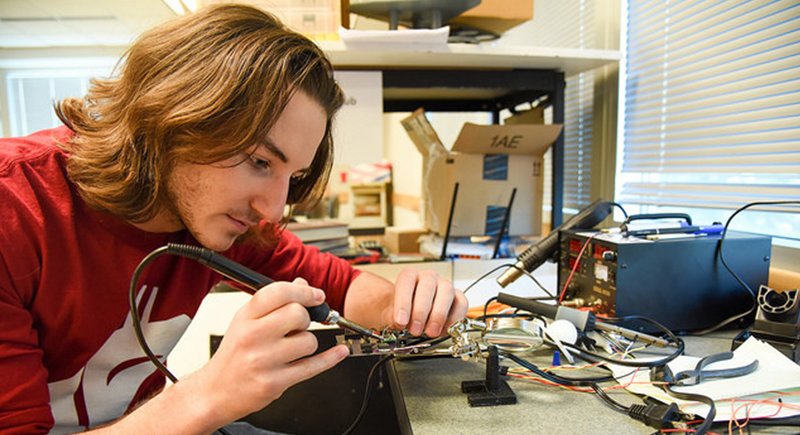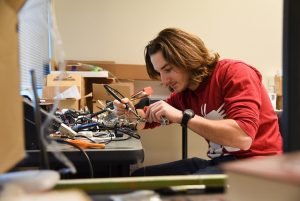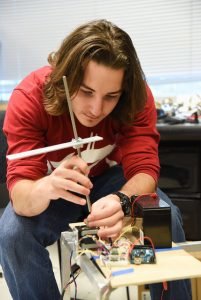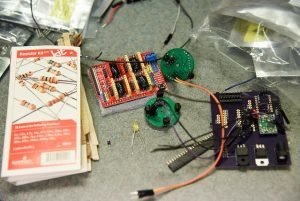
December 20, 2016 PNNL internship allows engineering student to work on groundbreaking security technology
By Maegan Murray
Before the age of 20, Gordan Gavric was already working on technology that continues to change the world of security.
Gavric started as an electrical engineering intern at the Pacific Northwest National Laboratory (PNNL) in the High School Student Research Internship program the summer of his high school junior year working for the Atom Probe group in (define EMSL). Now a junior at Washington State University Tri-Cities, Gavric has transitioned into working in  the Engineering Development Lab at PNNL, where he works with the creators of the millimeter wave imaging technologies used in body scanners that are deployed in airports across the world.
the Engineering Development Lab at PNNL, where he works with the creators of the millimeter wave imaging technologies used in body scanners that are deployed in airports across the world.
“It’s been pretty amazing,” Gavric said. “How many other interns get to work on this stuff? I started with PNNL my freshman year and I’ve been with them ever since. I’ve done everything from Python language programming, to circuit development, to building up and testing antennas using some very expensive, very cool pieces of hardware.”
The opportunities he was presented with through PNNL were the primary reason why he chose to attend Washington State University Tri-Cities.
“I think it was probably the best thing I could have done in terms of school and work,” he said. “I was interested in another university because their electrical engineering program was more based in radio and signal processing. But since then, I’ve taken classes here that are more oriented toward digital signal processing. I’ve received one of the best educations because I’m learning from the people that are actually doing it and they do it well.”
 Through his current position at PNNL, Gavric is using Python to develop a software application for nuclear security. He developed what is called a graphical user interface, or a GUI, that allows engineers to tweak parameters in real-time to better set instruments to protect a nuclear source. He is also working with millimeter wave antennas that are used in airport and security body scanners.
Through his current position at PNNL, Gavric is using Python to develop a software application for nuclear security. He developed what is called a graphical user interface, or a GUI, that allows engineers to tweak parameters in real-time to better set instruments to protect a nuclear source. He is also working with millimeter wave antennas that are used in airport and security body scanners.
“Seeing some of crazy concepts behind it and the engineering required to develop that technology and the creativity that was facilitated has been incredible,” he said. “It was not like we were just designing circuits. You got the sense that you could be really creative in the way you solve the big problems in the world with engineering. It has been amazing to see that type of things being done right here in Richland.”
Gavric said his position uniquely allows him to be exposed to engineering concepts and materials first at PNNL, which he then learns about in detail at WSU Tri-Cities.
“Last summer, I was tasked with building a resonant filter and I spent close to two days figuring out everything I could about it at PNNL,” he said. “Then today, in electronics class, we talked about a similar design and learned how to apply it a little differently. I get to first see it applied and then learn more about it. It definitely enriches me because I’m exposed in a real-world experience and then I dive into the details of it in class.”
Gavric said the combination of his WSU Tri-Cities education and his real-world experience at PNNL has poised him with unique experiences that he will continue to use throughout his career in engineering.
“I like that everything correlates really well,” he said. “Everything I learn in class, I see at my job. My teammates at PNNL are like, ‘Have you learned about x? Oh, you learned it last week, OK cool.’ It helps me bond with them.”
Gavric said he has also applied his experience at PNNL and what he is learning in the classroom at WSU Tri-Cities for external projects and leadership opportunities at the university. He and a couple of classmates started the robotics club on campus. He also is the chief justice for the Associated Students of Washington State University where he oversees the student government’s bylaws and judicial procedure.
“One of my favorite things about WSU and PNNL are the opportunities you are presented with,” he said. “WSU Tri-Cities is one of those places where if you have a will to do something, like starting an engineering club, you can. You can make the most out of anything. At PNNL, I’ve been provided with opportunities to advance in my career, like learning new engineering concepts and furthering my skillset.”
Plus, three of the five people on his team at PNNL either taught at or attended WSU Tri-Cities.
“I’m surrounded by fellow alumni,” he said. “It’s been pretty great.”
Interested in a career in electrical engineering? Visit https://tricities.wsu.edu/engineering/.





